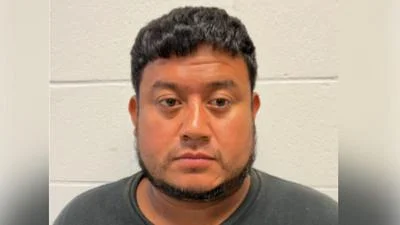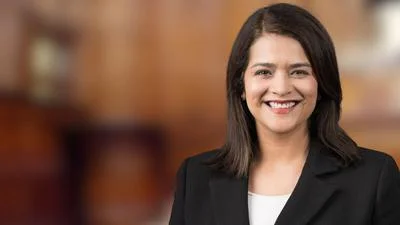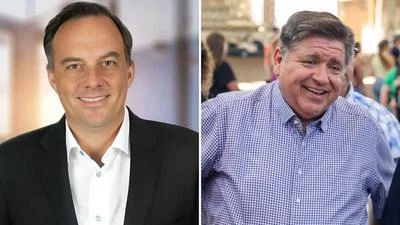Jackie Wilson (left) and Attorney Elliot Slosar | Loevy & Loevy
Jackie Wilson (left) and Attorney Elliot Slosar | Loevy & Loevy
A special prosecutor’s controversial criminal case against former Cook County assistant state’s attorney Nick Trutenko, who in 1989 successfully prosecuted Jackie Wilson for the 1982 murder of a Chicago police officer, is coming to a close.
On Nov. 14, the prosecution is expected to rest its case before Lake County Judge Daniel Shanes, who is presiding due to a conflict in Cook County. Trutenko and former assistant state’s attorney Andrew Horvat—who represented Trutenko during Wilson's third murder trial in 2020—are facing 14 charges. The defense is expected to request that the judge dismiss all charges, including perjury against Trutenko and official misconduct against Horvat.
The case resumed on Oct. 28 after an 11-month hiatus due to a rare interlocutory appeal—a challenge filed during the trial—of Judge Shanes’ ruling. The ruling had determined that a relationship between Trutenko and another assistant state’s attorney, Paul Fangman, was protected by attorney-client privilege, making their conversations off-limits in the trial. Fangman had been called as a witness against Trutenko, but the Illinois Appellate Court overruled the judge's decision.
A source who attended the trial last week told Chicago City Wire that the defense’s cross-examination of witnesses called by special prosecutor Lawrence Oliver showed the prosecution's case to be "virtually non-existent."
One key moment involved Trutenko’s defense attorney, Jim McKay, cross-examining Elliot Slosar, an attorney with the firm Loevy & Loevy, and a key witness for the state. McKay accused Slosar of attempting to set up Trutenko during Wilson’s third trial in 2020. Wilson had been convicted in 1983, along with his brother Andrew, for the execution-style murders of Officers William Fahey and Richard O’Brien. In the 1989 trial, when Trutenko successfully prosecuted Wilson, he was acquitted of the Fahey murder but convicted again for O’Brien’s murder. Wilson was sentenced to life in prison.
McKay’s questioning of Slosar was recounted by former Fraternal Order of Police (FOP) spokesman Martin Preib in his “Crooked City” column:
“McKay suggested that Slosar violated the rules of evidence when he didn’t turn over to special prosecutors a crucial baptismal certificate showing that Trutenko was godfather to [William] Coleman’s [a witness in the second Wilson trial] daughter. McKay’s line of questioning implied that Slosar kept this evidence from prosecutors in the hopes of a big ‘aha’ moment when the document was revealed in court—a moment that Slosar assumed would have compelled Trutenko to lie about his relationship to Coleman in an effort to protect the special prosecutors from their errant claims that Coleman could not be located.”
What also emerged during the trial, but has not been widely reported, is that Trutenko’s friendship with Coleman began years after Wilson’s second trial. At the time, Trutenko was in private practice, making the later relationship irrelevant to Wilson's conviction. Charges against Wilson were dropped before the conclusion of the 2020 trial, and charges against Trutenko and Horvat were filed in March 2023.
It is unclear when Judge Shanes will rule, but he could dismiss some or all of the charges. If some charges remain, the trial will continue, and the defense is likely to call additional witnesses.
In June 2021, Wilson filed a wrongful conviction lawsuit in federal court. Slosar, the state’s witness in the Trutenko trial, is Wilson’s attorney. In May, Cook County settled the suit for $17 million, and a separate settlement with the city is pending.
For Preib, former prosecutors, and others in law enforcement, the Jackie Wilson case—including the indictments of Trutenko and Horvat—illustrates the growing influence of the anti-police movement, which they believe is undermining not just Chicago, but the entire country.
“The trial … is the culmination of a decades-long crusade by Chicago’s radical left to free one of the city’s most notorious criminals, Jackie Wilson, for his role in the 1982 murder of two police officers during a traffic stop on the city’s South Side, and also to punish anyone who was involved in investigating and prosecuting Wilson,” Preib wrote. “And what better trophy could there be than convicting two prosecutors in Cook County: Nick Trutenko, who successfully prosecuted Jackie Wilson, and Andrew Horvat, who represented Trutenko.”





 Alerts Sign-up
Alerts Sign-up